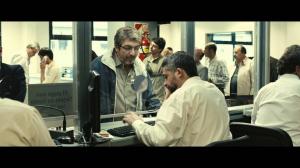Fight club (film): summary, analysis and characters
The fight Club, also known as Fight club (Fight club) is a 1999 film directed by David Fincher. It was not very successful at the box office, but it has held a place among the cult films. Its popularity may be due to the reflections it proposes on society and its way of life. It is a film adaptation of the novel by Chuck Palahniuk, published in 1996.
Summary of the movie
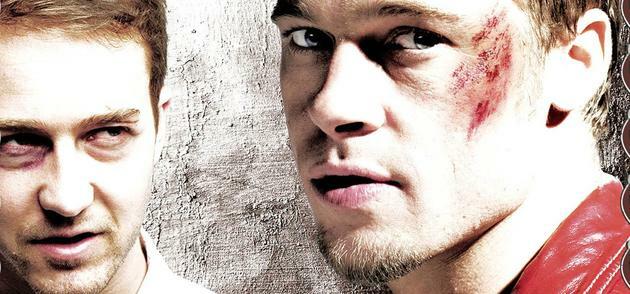
Introduction
The story is narrated by the protagonist, whose real name is never known. He is a middle class man who works as an expert in a car company. Lonely, he tries to fill his void by buying designer clothes and expensive decorations for his house.
As a result of the insomnia that he has suffered for six months, his mental health weakens. He decides to consult his doctor to prescribe some sleeping pills. The doctor refuses and challenges him to attend a support meeting for victims of testicular cancer to learn the true suffering.
Desperate, the narrator attends the meeting and pretends to be sick. Seeing the real pain of those men, he cries and lets off steam in such a way that that night he manages to sleep. From that moment on, he becomes addicted to support groups for different diseases.
Developing
The presence of another imposter in support groups begins to upset him and prevent him from crying. It is about Marla Singer, a mysterious woman who appears smoking in the back of the room at all meetings. The narrator confronts her, they both admit the charade, decide to divide up the groups and exchange phone numbers.
While returning from a business trip, he meets Tyler Durden on the plane, a soap maker with a unique philosophy of life that impresses and intrigues him. When he arrives at his house, the narrator discovers that there was an explosion in his apartment in which he lost all of his property. With no one to turn to, he ends up calling Tyler.
The two meet, talk about the current lifestyle, capitalism and consumerism, and in the end, Tyler challenges him: "I want you to hit me as hard as possible." Confused, the narrator accepts the challenge.
After the fight they both feel euphoric and Tyler invites the narrator to live in his house. The fights are more and more frequent and they begin to attract more men. Thus was born the fight club.
Marla appears again on the scene when she calls the narrator on the phone. The call occurs after she has overdosed on pills and asks for help in her suicide attempt. The narrator leaves the phone off the hook and ignores the matter. But the next morning, he discovers that Marla spent the night at her house. How was this possible? Tyler had picked up the phone, met her, brought her home, and they had sex.
In the meantime, the club is gaining more and more participants and spans several cities under Tyler's leadership. Little by little men begin to appear willing to blindly follow the orders of the leader, thanks to what which arises the Project Chaos, an anarchist group that undertakes acts of vandalism and violence throughout the town.
Conclution
Tyler disappears and, in an effort to stop the cycle of destruction of his soldiers, the narrator chases them across the country, with the strange feeling that he already knows all those places. One of the members of the organization reveals the truth: the narrator is really Tyler Durden.
The leader of Project Chaos appears in the hotel room and confirms that they are both the same person, two personalities in one man: While the narrator sleeps, Tyler takes his body to put his plan in action.
The narrator reveals his goals and tries to report them to the police, but his rival has accomplices everywhere, so he gets it. that he wants: to cause the explosion of the credit companies where all the bank records are to free the people of their debts. The two personalities fight, Tyler is shot by the protagonist and suddenly disappears. Marla and the narrator witness the demolition through the window, holding hands.
Main characters
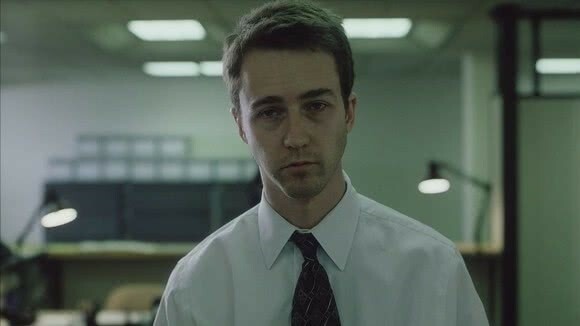
Storyteller
This character is played by Edward Norton. The name of the narrator-protagonist is never revealed throughout the film. He is an ordinary man, consumed by his work, exhaustion and loneliness, who begins to lose his mind as a result of persistent insomnia. His life changes when Tyler Durden and Marla Singer cross paths.
Tyler durden
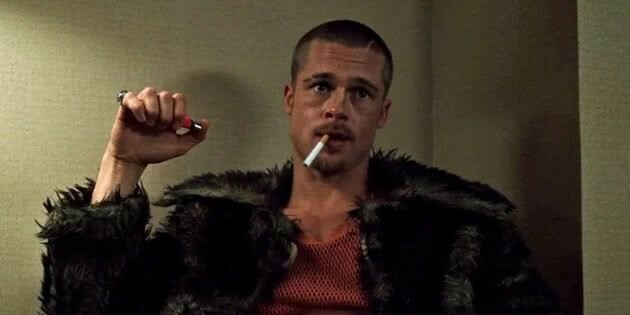
Tyler Durden, played by Brad Pitt, is the man the narrator meets on the plane. Soap maker, film projectionist and waiter in luxury hotels, Tyler survives with different jobs but does not hide his contempt for the social and financial system.
Fight club founder and leader of Project Chaos, it is discovered that this is another narrator personality who, while he slept, meticulously planned a revolution.
Marla Singer
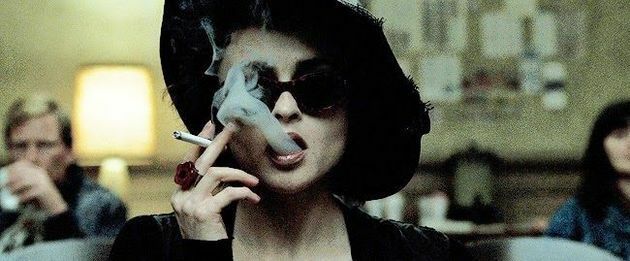
Marla Singer, played by Helen Bonham Carter, is a lonely and disturbed woman. She meets the narrator in the support groups they both attended seeking to fill the void in their lives.
After a failed suicide attempt, she becomes involved with Tyler, the narrator's other personality, and thus forms the third vertex of a rarefied triangle.
Analysis and interpretation of the film
The fight Club begins in media res, a Latin expression that means "in the midst of things or events." It is a literary technique. The film begins with a shot in which the narrator has a gun in his mouth, apparently held by Tyler, just before an explosion.
The story begins almost at the end of the denouement, which already tells us that it will not be happy. The development of the film will be the one that explains to us who these men are and what were the events that led them to that point.
The narrator is not omniscient. On the contrary, he is confused, maddened by insomnia and exhaustion. What this narrator tells, that is, what is seen through his gaze, is not necessarily reality. the viewer cannot trust him, which is understood as the film progresses.
This distrust is confirmed when it is discovered that they are dissociated personalities and that, after all, this man was always alone, fighting against himself. Upon obtaining this information, the viewer understands that there were clues in the previous sequences: they have the same suitcase at the get to know each other, they only pay for a ticket on the bus, and lastly, the narrator is never present when Tyler and Marla meet. find.
Two sides of the same coin
The narrator begins as a defeated, robotic man with no life purpose. He fulfills his obligations to society, has a stable job, has his own house full of everything he might want to and yet he is extremely unhappy, causing him insomnia of more than six months.
Just before meeting Tyler Durden during the flight, he listens to his inner monologue in which he wishes the plane to crash. It is about someone desperate, who can not find any way out of the routine that consumes him. The encounter with Tyler changes his destiny, as he encourages him to leave behind everything that makes him feel cornered.
Brad Pitt and Edward Norton in the movie The fight Club
From the beginning of his speech, somehow, Tyler's intentions can be guessed: perceives his anger and contempt for society, and also his knowledge of chemicals and bombs homemade. The danger is notorious and that draws the attention of the narrator, who cannot hide his admiration.
They are opposites in everything, a fact that is clear in the appearance of their houses, for example: the narrator lived in a meticulously decorated middle-class apartment. Tyler lived in an old, dirty, and empty house. Initially affected by the move, he begins to adapt and cuts ties with the outside world, stops watching TV and stops feeling affected by advertising.
Living with Tyler irreversibly changes the narrator: he attends his dirty work with bloodstains, loses his teeth, his physical and mental state deteriorates and he grows thinner, while his other personality becomes more robust.
Durden's chemical burn on his hand is a symbol of his power, a permanent mark of his philosophy: we cannot occupy our minds with distractions. You need to feel the pain and act on it.
As evidenced by the dialogue between the two personalities, Tyler is everything the narrator wanted to be: impulsive, brave, disruptive, ready to destroy the system. It is a materialization of his revolt and his despair in the face of routine and style. life he led: Tyler was created to change everything the storyteller couldn't change on his own same.
Capitalism and consumerism
The fight Club It is a critical reflection on the consumer society in which we live and the effects it causes on individuals. The film begins by showing various famous brands and how people consume these products in order to fill the void within.
The narrator spends most of his time working to support himself and, when he is free but alone, he ends up spending all his money on material goods. Unnamed, this man is a representation of the common citizen, who lives to work and gather the money that he then he will spend on things that he does not need, but that the consumer society induces him to to have.
Because of this vicious circle, individuals are transformed into mere consumers, spectators, slaves of a system that defines the value of each according to what they possess, exhausting their entire existence. That is something that stands out in the monologue that the protagonist does at the airport, when he reminds himself that "This is your life and she is ending one minute at a time."
When your home and things are destroyed, you finally feel free. In Durden's words, "Only after losing everything are we free to do what we want." After parting with the material assets that controlled him, he begins to devise a plan to destroy the capitalist system and free the people from debt.
The fight as catharsis
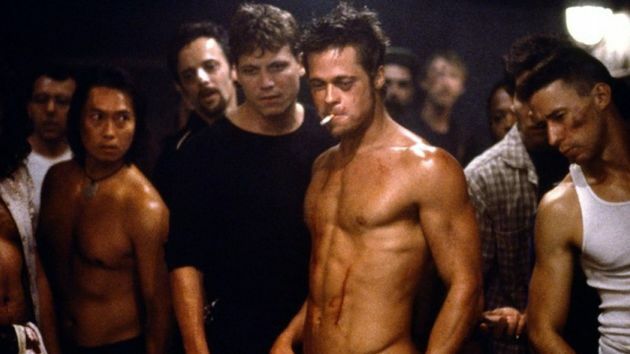
Violence arises as a momentary way of making those men feel alive. As the protagonist explains, the most important thing in fights is not winning or losing, but the sensations that arouse: pain, adrenaline, power. Going to fight club is like waking up from a long sleep to unleash all your pent-up rage and experience a kind of release.
Loneliness and precarious human relationships
A transversal characteristic of all the characters is extreme loneliness. Condemned for being inside the system (like the narrator) or outside it (like Marla), they all lead an isolated existence. When they are in the support group, Marla and the protagonist seek the same thing: human contact, honesty, the possibility of crying on the shoulder of a stranger.
The narrator is so destroyed by his loneliness, his mental health is so precarious, that he ends up creating another personality, a friend with whom to share everything, a partner in struggle. Marla is so helpless that when she attempts suicide and needs help, she calls someone she has just met.
It is possible that this inability to relate socially, this existential exile, is what attracts men fight club and, even more, the Project Chaos soldiers, who live, eat and sleep together, fighting for the same cause. It is this feeling of belonging that seems to draw them towards Tyler, someone who shares the same revolt and promotes hatred for the capitalist society that excluded him.
Open end
The end of the film does not offer a concrete answer to the viewer about what happened. The two personalities conflict. The narrator is wounded, although he apparently defeats Tyler who disappears immediately after being shot.
Marla, who had fled the city to protect herself from Project Chaos, is kidnapped by the soldiers and taken to the hideout. They shake hands and the narrator tells him: "You met me at a very strange moment in my life." Both watch the explosion of the buildings through the window while the song is heard in the background Where is my mind? of the Pixies.
Even though the Project Chaos plan appears to have worked, the viewer cannot know the true implications, nor does he know for sure whether or not Tyler Durden died.
Theories of fans
The fight Club became a cult film that continues to attract the attention of fans, who have come up with their own theories. A rather curious theory states that Tyler Durden was real and took advantage of a lonely man with fragile health to manipulate him and put him to lead a terrorist group.
Another very popular theory is that Marla Singer was imaginary. If this theory were correct, the protagonist would have lived a love triangle with himself and everything that happened in the film would have been just a play of his imagination.
David Fincher: Director of The fight Club
David Fincher was heavily criticized in 1999 when he directed The fight Club due to his violent and anarchic mood that affected the box office. However, the DVD release was a resounding success and broke a sales record. Either "despite" or "thanks to" his controversial nature, Fincher conquered the title of cult director.
Book The fight Club
The movie The fight Club (Fight club or Fight club) is the film adaptation of the eponymous book written by Chuck Palahniuk in 1996.
Is the book or the movie better? It is the question that every viewer or reader asks himself whenever there is the same story captured in different media.
This is an adaptation that respects the novel a lot. However, there are significant changes that are worth knowing and discovering in the book, ranging from the the way the Narrator and Tyler Durder characters are known, down to the way the final.
If you have not yet had the opportunity to read or see The fight Club (Fight club or Fight club), it is time to enjoy a story that will change the way you see the world.
If you liked this article you can also read:
- Fight Club Book
- The 30 best cult movies
(Text translated by Andrea Imaginario).

